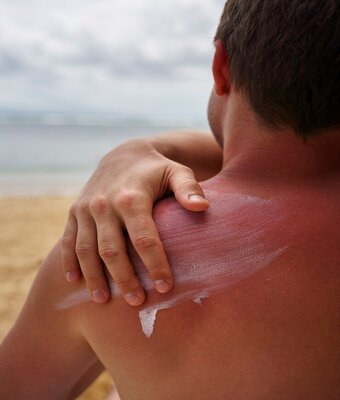
Dealing with Sun Cream Allergy: Expert Tips: What You Need to Know
In our quest for sun protection, sunscreen plays a crucial role. However, what happens if your skin reacts negatively to this essential product? Let’s delve into the intricacies of allergic reactions to sunscreen and how you can navigate this issue effectively.
Understanding Sunscreen Composition
Sunscreens are formulated with various components aimed at enhancing their effectiveness in absorbing UV rays while also providing a pleasant fragrance and ensuring a suitable shelf-life. While most individuals experience no adverse effects from these ingredients, some may develop specific allergic reactions, resulting in symptoms such as redness, itching, or even eczema-like reactions known as contact allergic dermatitis. In severe cases, blisters may also occur.
The Complexity of Allergies
Interestingly, individuals can develop allergies to substances they’ve used without any issues for years. Once an allergic reaction occurs, it’s likely to persist. Furthermore, it’s not always the chemical itself triggering the reaction but rather a combination of the chemical and sunlight, leading to a condition known as photocontact dermatitis.
Navigating Allergic Reactions
If you find yourself experiencing reactions to sunscreens, several steps can help mitigate discomfort and find a suitable solution:
Switching Brands: Consider trying a different sunscreen brand to identify if the reaction is specific to certain formulations or ingredients.
Opt for Sensitive Skin Formulations: Look for sunscreens specifically designed for sensitive skin. These formulations often contain physical blocking agents like titanium dioxide and fewer chemical sunblock molecules, reducing the likelihood of allergic reactions.
Patch Testing: Before fully applying a new sunscreen, perform a patch test. Apply a small amount of the product on a patch of skin, such as your forearm, and observe for any adverse reactions over a few days. If a rash or irritation develops, discontinue use of that product.
Consult a Dermatologist: For a comprehensive assessment of potential allergies, consult a dermatologist specializing in allergic reactions. Patch testing conducted by a professional can pinpoint the specific component triggering your reaction, enabling you to make informed decisions when selecting sunscreens.
Recommended Products
Several sunscreen brands cater to individuals with sensitive skin, offering formulations that prioritize gentle ingredients while still providing effective sun protection. Examples include Sunsense Sensitive, P20, and Actinica.
In conclusion, allergic reactions to sunscreen can be challenging to navigate, but with the right approach, you can find suitable alternatives and mitigate discomfort effectively. By understanding sunscreen composition, recognizing allergic reaction symptoms, and exploring appropriate products and testing methods, you can ensure safe and comfortable sun protection tailored to your skin’s needs. Remember, prioritizing skin health is key in your journey towards optimal sun care.
FAQ
Can sun cream allergies develop suddenly?
Yes, individuals can develop allergies to sun cream ingredients over time, even after years of use without any issues.
Are there any specific symptoms of sun cream allergy?
Symptoms may vary but commonly include redness, itching, eczema-like reactions, and in severe cases, blistering.
How can I test if I’m allergic to a sun cream?
Conduct a patch test by applying a small amount to a skin patch and monitoring for reactions over a few days.
Can I still protect my skin from the sun if I have a sun cream allergy?
Yes, consider alternatives such as sunscreens designed for sensitive skin or physical blocking agents like titanium dioxide.
Is it possible to identify the specific ingredient causing my sun cream allergy?
Yes, consulting a dermatologist for patch testing can help pinpoint the allergen, enabling informed product selection.


